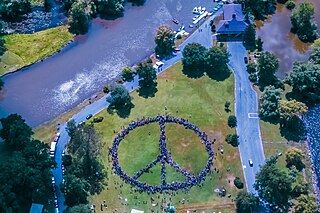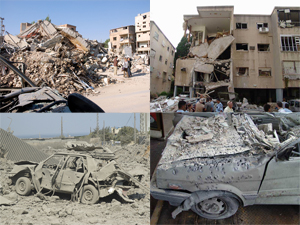
Human rights are universally recognized moral principles or norms that establish standards of human behavior and are often protected by both national and international laws. These rights are considered inherent and inalienable, meaning they belong to every individual simply by virtue of being human, regardless of characteristics like nationality, ethnicity, religion, or socio-economic status. They encompass a broad range of civil, political, economic, social, and cultural rights, such as the right to life, freedom of expression, protection against enslavement, and access to education.

Peacekeeping comprises activities, especially military ones, intended to create conditions that favor lasting peace. Research generally finds that peacekeeping reduces civilian and battlefield deaths, as well as reduces the risk of renewed warfare.

The Charter of the United Nations (UN) is the foundational treaty of the United Nations. It establishes the purposes, governing structure, and overall framework of the UN system, including its six principal organs: the Secretariat, the General Assembly, the Security Council, the Economic and Social Council, the International Court of Justice, and the Trusteeship Council.
International human rights law (IHRL) is the body of international law designed to promote human rights on social, regional, and domestic levels. As a form of international law, international human rights law is primarily made up of treaties, agreements between sovereign states intended to have binding legal effect between the parties that have agreed to them; and customary international law. Other international human rights instruments, while not legally binding, contribute to the implementation, understanding and development of international human rights law and have been recognized as a source of political obligation.

The Peace and Security Council (PSC) is the organ of the African Union in charge of enforcing union decisions. It is patterned somewhat after the United Nations Security Council. The PSC is also the main pillar of the African Peace and Security Architecture (APSA), and works with other pillars of the APSA in order to promote "peace, security and stability in Africa". The specific goal of the Peace and Security Council (PSC) is the "prevention, management and resolution of conflicts". To achieve these goals, it involves subsidiary organizations such as the Military Staff Committee and the Committee of Experts.

The Economic, Social and Cultural Council (ECOSOCC) is an advisory body of the African Union designed to give civil society organizations (CSOs) a voice within the AU institutions and decision-making processes. ECOSOCC is made up of civil society organizations from a wide range of sectors including labour, business and professional groups, service providers and policy think tanks, both from within Africa and the African diaspora.
Fatima Zohra Karadja is a Vice-President for the African Union's Economic, Social and Cultural Council for Northern Africa.

The Economic Community of Central African States is an Economic Community of the African Union for promotion of regional economic co-operation in Central Africa. It "aims to achieve collective autonomy, raise the standard of living of its populations and maintain economic stability through harmonious cooperation".

Peacebuilding is an activity that aims to resolve injustice in nonviolent ways and to transform the cultural and structural conditions that generate deadly or destructive conflict. It revolves around developing constructive personal, group, and political relationships across ethnic, religious, class, national, and racial boundaries. The process includes violence prevention; conflict management, resolution, or transformation; and post-conflict reconciliation or trauma healing before, during, and after any given case of violence.

The African Union (AU) is a continental union of 55 member states located on the continent of Africa. The AU was announced in the Sirte Declaration in Sirte, Libya, on 9 September 1999, calling for the establishment of the African Union. The bloc was launched on 9 July 2002 in Durban, South Africa. The intention of the AU was to replace the Organisation of African Unity (OAU), established on 25 May 1963 in Addis Ababa by 32 signatory governments; the OAU was disbanded on 9 July 2002. The most important decisions of the AU are made by the Assembly of the African Union, a semi-annual meeting of the heads of state and government of its member states.

United Nations Security Council resolution 1197, adopted unanimously on 18 September 1998, after reaffirming its primary responsibility to maintain international peace and security, the Council addressed co-operation efforts with the Organisation of African Unity (OAU).

United Nations Security Council resolution 1366, adopted unanimously on 30 August 2001, after reaffirming resolutions 1196 (1998), 1197 (1998), 1208 (1998), 1265 (1999), 1296 (1999), 1318 (2000), 1325 (2000) and 1327 (2000) concerning aspects of armed conflict, the Council reiterated its aim to prevent armed conflict as part of its responsibility to maintain international peace and security.
The Panel of the Wise (PoW) is a consultative body of the African Union, composed of five appointed members who each serve three year terms. Its mandate is to provide opinions to the Peace and Security Council on issues relevant to conflict prevention, management, and resolution. Representatives are chosen for the North, East, South, West, and Central regions of the continent.

United Nations Security Council resolution 1625, adopted unanimously at the 2005 World Summit on 14 September 2005, the Council adopted a declaration on the role of the Security Council in conflict prevention, particularly in Africa where many armed conflicts were taking place.

United Nations Security Council Resolution 1983 was adopted unanimously on June 7, 2011, after recalling meetings on HIV/AIDS in Africa and in the mandates of peacekeeping operations, as well as resolutions 1308 (2000), 1325 (2000), 1820 (2008), 1888 (2009), 1889 (2009), 1894 (2009) and 1960 (2010). The Council encouraged the inclusion of HIV/AIDS prevention, treatment, care and support in its peacekeeping mandates.
United Nations Security Council Resolution 1809 was unanimously adopted on 16 April 2008.
Emmanuel Bombande is a conflict resolution, peacebuilding, and development professional from Accra, Ghana, and is the Chair of the Board of the Global Partnership for the Prevention of Armed Conflict.
The West Africa Network for Peacebuilding (WANEP) is a leading Regional Peacebuilding organisation founded in 1998 in response to civil wars that plagued West Africa in the 1990s. Over the years, WANEP has succeeded in establishing strong national networks in every Member State of ECOWAS with over 550 member organisations across West Africa. WANEP places special focus on collaborative approaches to conflict prevention, and peacebuilding, working with diverse actors from civil society, governments, intergovernmental bodies, women groups and other partners in a bid to establish a platform for dialogue, experience sharing and learning, thereby complementing efforts at ensuring sustainable peace and development in West Africa and beyond.
The African Peace and Security Architecture (APSA) includes the three central instruments conflict prevention, conflict management and peace building of the African Union (AU), the Regional Economic Communities (RECs) as well as the Regional Mechanism (RMs).









